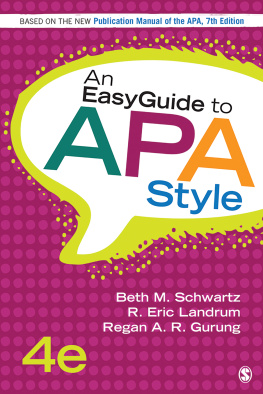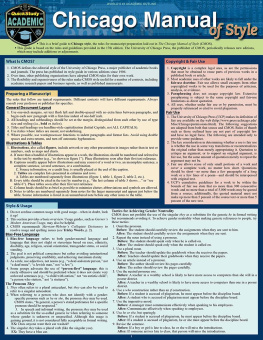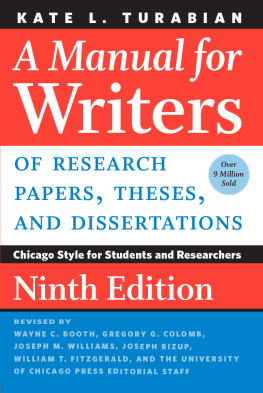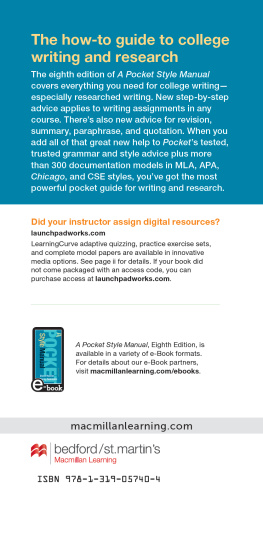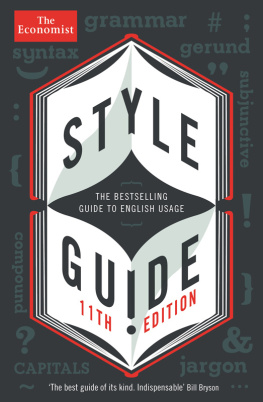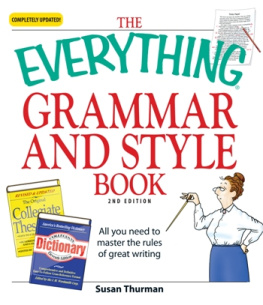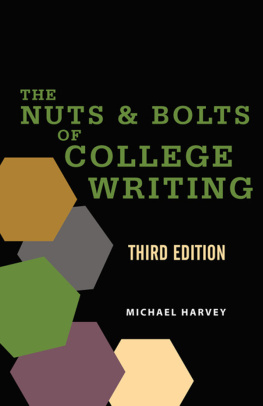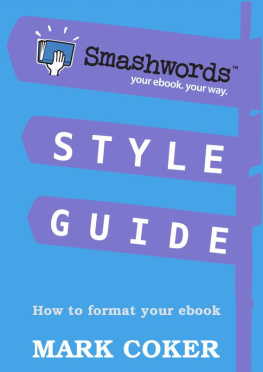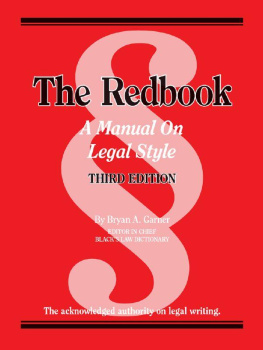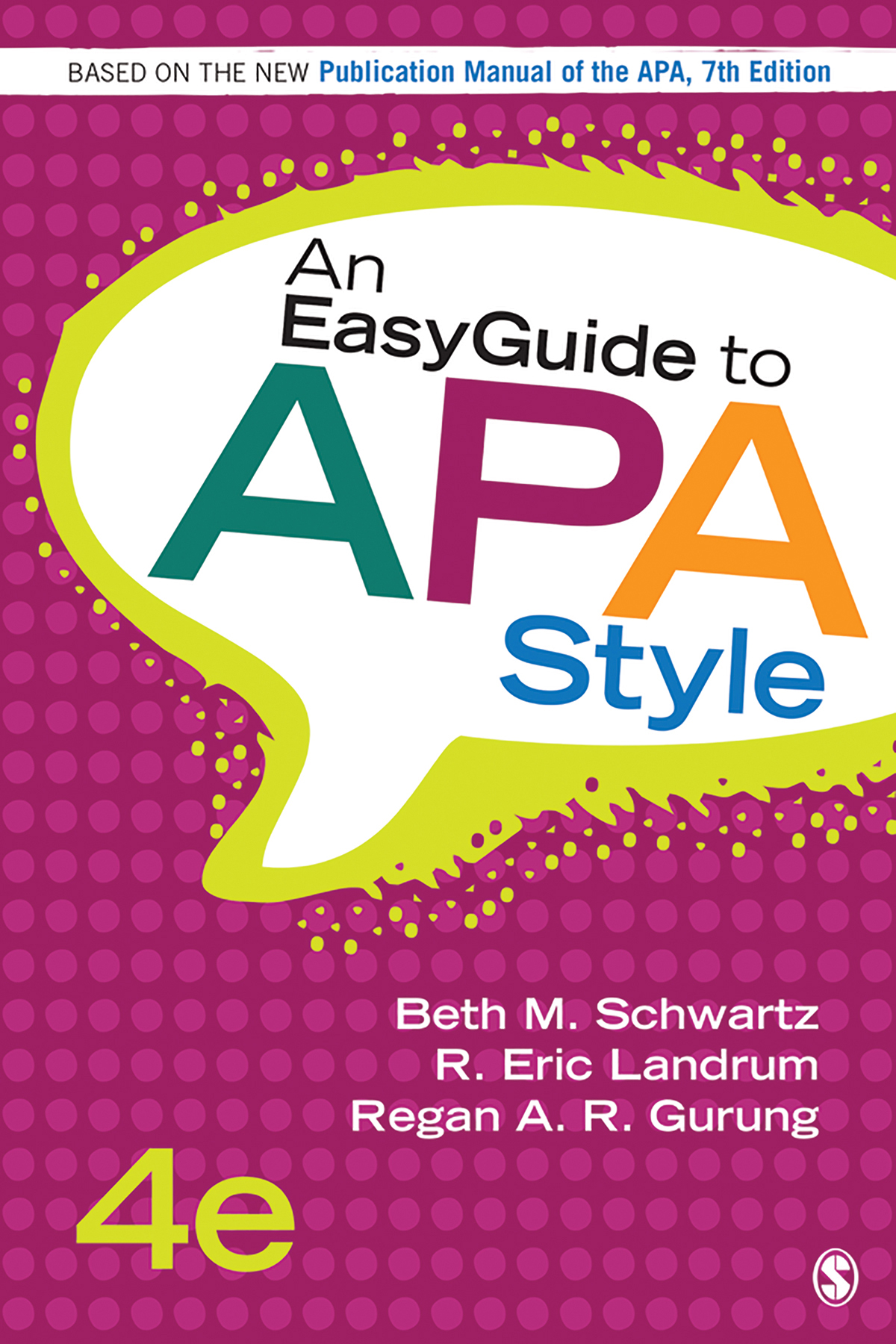Sara Miller McCune founded SAGE Publishing in 1965 to support the dissemination of usable knowledge and educate a global community. SAGE publishes more than 1000 journals and over 800 new books each year, spanning a wide range of subject areas. Our growing selection of library products includes archives, data, case studies and video. SAGE remains majority owned by our founder and after her lifetime will become owned by a charitable trust that secures the companys continued independence.
Copyright 2021 by SAGE Publications, Inc.
All rights reserved. Except as permitted by U.S. copyright law, no part of this work may be reproduced or distributed in any form or by any means, or stored in a database or retrieval system, without permission in writing from the publisher.
All third party trademarks referenced or depicted herein are included solely for the purpose of illustration and are the property of their respective owners. Reference to these trademarks in no way indicates any relationship with, or endorsement by, the trademark owner.
For Information:
SAGE Publications, Inc.
2455 Teller Road
Thousand Oaks, California 91320
E-mail: order@sagepub.com
SAGE Publications Ltd.
1 Olivers Yard
55 City Road
London, EC1Y 1SP
United Kingdom
SAGE Publications India Pvt. Ltd.
B 1/I 1 Mohan Cooperative Industrial Area
Mathura Road, New Delhi 110 044
India
SAGE Publications Asia-Pacific Pte. Ltd.
18 Cross Street #10-10/11/12
China Square Central
Singapore 048423
Library of Congress Cataloging-in-Publication Data
Names: Schwartz, Beth M., author. | Landrum, R. Eric, author. | Gurung, Regan A. R., author.
Title: An easyguide to APA style / Beth M. Schwartz, Endicott College, R. Eric Landrum, Boise State University, Regan A. R. Gurung, Oregon State University.
Other titles: Easy guide to APA style
Description: Fourth edition. | Thousand Oaks, California : SAGE, [2021] | Includes bibliographical references and index.
Identifiers: LCCN 2020025064 | ISBN 9781544323725 (spiral bound ; alk. paper) | ISBN 9781544323701 (epub) | ISBN 9781544323718 (epub) | ISBN 9781544323732 (ebook)
Subjects: LCSH: PsychologyAuthorshipStyle manuals. | Social sciencesAuthorshipStyle manuals.
Classification: LCC BF76.7 .S39 2021 | DDC 808.06/615dc23
LC record available at https://lccn.loc.gov/2020025064
Printed in the United States of America
This book is printed on acid-free paper.
Acquisitions Editor: Leah Fargotstein
Editorial Assistant: Sam Diaz
Production Editor: Andrew Olson
Copy Editor: Cate Huisman
Typesetter: Hurix Digital
Proofreader: Dennis Webb
Indexer: Integra
Cover Designer: Candice Harman
Marketing Manager: Victoria Velasquez
Preface
Traveling to a new place can be exciting, but going anywhere for the first time always has its challenges. Whether a new city, a new school, or a new job, it takes time to learn the ins and outs of the place, its rules and customs. It is a similar process learning to write in American Psychological Association (APA) Stylethat is, learning when to use italics, capitalization rules, and abbreviations; how to treat numbers; what citations and references should look like; how to set margins; and what headings, tables, and figures should look like as required by APA format. At first blush, APA Style is almost like a foreign language with its own syntax and grammar, and the manual with all its rules can be as tricky as a labyrinth for any newcomer to navigate. Rules for that foreign language (think syntax, perhaps?) changed a bit with the release of the seventh edition of the APA Publication Manual (hereafter PM; APA, 2020). With this EasyGuide in hand, you take a great step toward simplifying the process of learning how to write papers in APA Style. We will help you through the maze of rules, including the changes to those rules for those who used the earlier sixth edition (APA, 2010), and you may even have (some) fun along the way.
Over the years, we have witnessed the many problems our students have when confronting the numerous details involved in creating APA research papers, term papers, or lab reports. We see the frustration our students feel when trying to find the information they need in the PM amid the voluminous details that primarily apply to faculty members or graduate students submitting manuscripts for publication. Of course, there is also the problem of unlearning APA Style with the seventh edition, which includes some significant changes in some of the well-known formatting rules. Some of us who have lived with the sixth edition for about 10 years now need an EasyGuide more than ever. If your needs are similar to our students needs (i.e., writing papers for class), if you need to learn about the changes in APA Style based on the seventh edition of the PM, or even if you are preparing a traditional manuscript for publication, this EasyGuide will serve you well. As we noted in past editions of this EasyGuide, it is possible that if you are in need of a way to cite and report a rare type of reference or an uncommon ordinal scale statistic, then you may also need to also consult the PM.
Our Reader-Friendly Approach
We decided to present the essentials of APA Style using a conversational tone in hopes of making this book and the task of learning how to write more enjoyable. We need to state up front that although we address the details of writing papers in APA Style and format, there are places all over this book where we do not use APA Style and format. For example, because this book conforms to the publishers design, you will not see double-spaced lines with 1-inch margins, and you will notice, for example, that the opening paragraph of each chapter and the first paragraph following a Level 1 heading are not indented. We also flex our funny bones (or muscles) when appropriate. (Well, we think were funny anyway.) We intend for this to make for easier reading, but note that it is not APA Style. And you will notice the latest edition of the EasyGuide is once again spiral bound to provide easy access to all the information as it lies flat on the desk next to you while you work.
We included some sample papers to illustrate where all the basic rules pertain to writing. We believe by using the sample papers, you will be less likely to overlook the different aspects of APA Style commonly omitted when first learning this type of writing. We also believe that reviewing the most common errors that we have seen over the years () are unique, illustrating the details not to forget and where in the paper these details apply.

